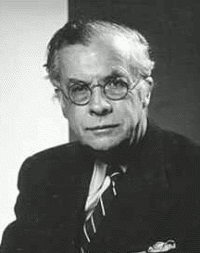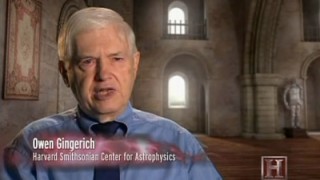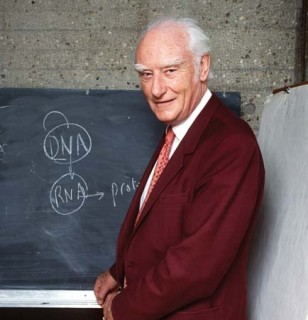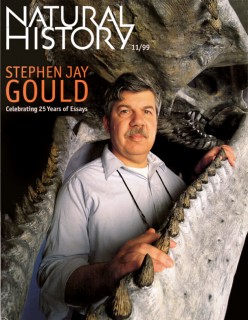“Thus, from the war of nature, from famine and death, the most exalted object which we are capable of conceiving, namely, the production of the higher animals, directly follows.”—Charles Darwin[1]
…by Jonas E. Alexis

George Orwell once declared that some ideas are so ridiculous that only an intellectual could believe them. There are some truths in this. Orwell was not castigating all intellectuals as fools, since he himself was one. Orwell was simply saying that ideas have consequences, and many of the ideas that have turned Europe and America into shackles have come directly from intellectuals who thought that they were wiser than anyone else.
As the noted mathematician and philosopher A. N. Whitehead rightly suggested, intellect should never be equated with wisdom, and Thomas Carlyle declared that there is such a thing called “unwise intellect.” I have many disagreements with Thomas Sowell (most particularly with respect to capitalism and the Middle East), but he certainly has a point when he said:
“Sheer brainpower—intellect, the capacity to grasp and manipulate complex concepts and ideas—can be put at the service of concepts and ideas that lead to mistaken conclusions and unwise actions, in light of all the factors involved, including factors left out of some of the ingenious theories constructed by the intellect. Brilliance—even genius—is no guarantee that consequential factors have not been left out or misconceived.”[2]
A classic example is Social Darwinism and the intellectuals who were behind the movement.
Social Darwinism spread very quickly right after it began to be a heated discussion among British intellectuals. Then, the next logical step was practical action which came into full bloom at the dawn of the twentieth century. During that time, it was widely argued that involuntary sterilization and even
“the segregation of the mentally handicapped were necessary to prevent the inheritance of pathological traits…By 1940, thirty American states had at one time or another passed sterilization laws for the mentally ill.”[3]
Eugenic circles and movements got established pretty quickly both in Europe and America and even in Asian countries such as China.[4] According to leading intellectuals of that era, such as H. H. Goddard, the state should do whatever they can to keep so-called imbeciles and idiots “from ever marrying or becoming parents.”
Margaret Sanger believed that “the most urgent problem today is how to limit and discourage the over-fertility of the mentally and physically defective [and that] possibly drastic and Spartan methods may be forced upon American society if it continues complacently to encourage the chance and chaotic breeding that has resulted from our stupid, cruel sentimentalism.”[5]
This eugenic idea was so strong and popular that Oliver Wendell Holmes, a surviving Civil War veteran, himself wrote: “Three generations of imbeciles are enough.”[6]
Francis Galton, Charles Darwin’s cousin and one of the leading figures in the movement who actually coined the term “eugenics,” declared,
“We greatly want a brief word to express the science of improving the stock…especially in the case of man. The word eugenics sufficiently expresses the idea.”[7]

To “improve the stock,” according to social Darwinian principle and eugenic ideology, the “morons,” the “imbeciles,” and the “idiots” had to be exterminated. This idea was quickly picked up by many British intellectuals. Julian Huxley, Aldous Huxley’s brother, wrote:
“We must be able to pick up the genetically inferior stocks with more certainty, and we must set in motion counter-forces making for faster reproduction of superior stocks.”[8]
How should that be done? Huxley provided a solution:
“The lowest strata are reproducing too fast. Therefore… they must not have too easy access to relief or hospital treatment lest the removal of the last check on natural selection should make it too easy for children to be produced or to survive; long unemployment should be a ground for sterilization.”[9]
Likewise, Nobel Prize winner Alexis Carrel declared that lunatics, imbeciles, and criminals “should be humanely and economically disposed of in small euthanasic institutions supplied with proper gases.”[10]
Throughout Darwin’s The Descent of Man we hear the voices of Hebert Spencer and earlier writers echoing over and over. Darwin wrote:
“We build asylums for the imbecile, the maimed, and the sick; we institute poor laws; and our medical men exert their utmost skills to save the life of every one to the last moment…
“[If we] do not prevent the reckless, the vicious and otherwise inferior members of society from increasing at a quicker rate than the better class of men, the nation will retrograde, as has occurred too often in the history of the world.”[11]
After the publication of The Descent of Man, Europe was in an intellectual shift. Darwin’s ideas as articulated in The Descent of Man spread both in Europe and America almost simultaneously, and countries such as France, Russia, Austria, etc., began to adopt the eugenics system.[12]
Moreover, prior to Darwin, natural scientists were largely Christians,[13] who unanimously maintained that this was “God’s universe” and that pursuing science would glorify the Creator and would benefit all mankind.[14]
 Even after Darwin, natural scientists were overwhelmingly Christians, and some even found that Darwin’s overarching goals were compatible with God’s creation.[15] Louis Agassiz was a classic example. (In our time, Owen Gingerich and Francis Collins are classic examples.[16])
Even after Darwin, natural scientists were overwhelmingly Christians, and some even found that Darwin’s overarching goals were compatible with God’s creation.[15] Louis Agassiz was a classic example. (In our time, Owen Gingerich and Francis Collins are classic examples.[16])
Among all the intellectuals who were quick to jump on the eugenics bandwagon, there was an abiding form of hatred toward Christianity, most particularly against the Catholic Church, which was viewed as the mother of all evil.
The Church has always had an interest in helping the poor (who can forget Mother Theresa?), alleviating suffering, providing shelter to the needy, the mentally handicapped, the weak, etc. Sanger in particular never missed the opportunity to attack the Church. She wrote that
“In the moral code developed by the Church, women have been so degraded that they have been habituated to look upon themselves through the eyes of men.”[17] Sanger proposed contraception and birth control as an alternative to the teachings of the Church.
It must be said in passing that in America, the WASP ruling class fell under the spell of birth control and contraception and made alliance with Jewish revolutionary movements and sociologists such as Louis Wirth. That proved to be detrimental in the long run. Wirth for example was a covert disciple of Joseph Stalin and he seemed to have noticed that the WASP did not have a serious intellectual and religious mechanism to fight ideological forces such as Jewish movements. He himself declared:
“Whereas the internal division and lack of cohesion of the Protestant denominations detracts from their capacity to play the role of a dominant group effectively, the relative internal unity and concentration of settlement of the Catholic groups in the urban centers increases their capacity to act collectively and to develop an appropriate group consciousness.”[18]
It was inevitable, then, that Wirth would use sociology as a weapon to attack the Catholics. Like John B. Watson who used behaviorism to cover his sexual tracks and weaknesses and who unleashed that ideology upon society in the form of psychology, Wirth used sociology to unleash Stalinism in America and to attack the Catholics.
 Wirth himself declared that since America at the time was “one third Roman Catholic…some of the key skilled jobs are virtually monopolized by certain groups [the Catholics, of course] whose national origin makes them suspect.”[19] But Wirth was far from alone in his attack on the teachings of the Church.
Wirth himself declared that since America at the time was “one third Roman Catholic…some of the key skilled jobs are virtually monopolized by certain groups [the Catholics, of course] whose national origin makes them suspect.”[19] But Wirth was far from alone in his attack on the teachings of the Church.
Gunner Myrdal, one of the flaming psychological ideologues during that time and supposedly the author of The American Dilemma, declared,
“The strength of church and religion in America presents another inhibition. Specifically, the fundamentalistic Protestant religion in some of the regions where fertility is highest in the South, and the Catholic Church in the big Northern cities are against discussions of population policy.”[20]
Some of the first victims in this ideological war were the blacks, who knew very little of what was taken place. At the same time, the Rockefeller Foundation and other WASP ruling elites were supporting radical sexual perverts such as Alfred Kinsey. The Rockefeller Foundation in particular was a breeding ground for eugenic ideology.[21] The WASP ruling class didn’t learn the lesson that you cannot scoop flame into your lap and not have your clothes catch on fire.
Yet in order to absolve herself from rigorous criticism and perhaps to get more support, Sanger declared that “advocates of Birth Control are not seeking to attack the Catholic Church.”[22]
Sanger knew pretty well that the Catholic Church stood in opposition to birth control, and Sanger was advocating birth control. Sanger knew pretty well that you cannot build with your left hand while your right hand seeks to destroy.
But Sanger could hardly be the only person to take this radical approach. Consider, for example, Madison Grant, one of the leading eugenicists of that era. Grant wrote:
“Mistaken regard for what are believed to be divine laws and a sentimental belief in the sanctity of human life, tend to prevent both the elimination of defective infants and the sterilization of such adults as are themselves of no value to the community. The laws of nature require the obliteration of the unfit, and human life is valuable only when it is of use to the community.”[23]
In other words, if you or your grandparents are too old and are no longer of use to society, you ought to be eliminated or sterilized. Grant’s “influence was crucial in the passage by a majority of the states of coercive sterilization statutes, by which tens of thousands of Americans deemed to be unworthy of procreation were sterilized from the 1930s to the 1970s.”[24]
Grant continued:
“The church assumes a serious responsibility toward the future of the race whenever it steps in and preserves a defective strain [the ‘mentally retarded’]… The societies for charity, altruism, or extension of rights…[caused] more injury to the race than black death or smallpox.”[25]
Grant certainly got something right: the Church, in its traditional and essential teachings, has always stood up against obliterating the weak and the helpless. Granted, greed and power have always been a temptation that plagued the race of men, including Christians, who on several occasions find it suitable to live with comfortable lies.
But Western civilization is Western civilization because there was a moral and—may I dare say, divine—institution. And that divine institution produced blessings in the philosophical, moral, historical and scientific realm for all mankind. It was largely for this reason that the noted historian of science David C. Lindberg writes in his magnum opus The Beginnings of Western Science:
“If we compare the support given to the study of nature by the early church with the support available from any other contemporary social institution, it will become apparent that the church was one of the major patrons—perhaps the major patron—of scientific learning.” [26]
This is hardly disputable among serious historians of science.[27]
Having examined the ideologies behind the social Darwinism movement, G. K. Chesterton labeled it “the survival of the nastiest.”[28]
SOCIAL DARWINISM AND ENLIGHTEMENT PRINCIPLES

A last point we need to make here is that those who embraced social Darwinism were almost exclusively following Enlightenment principles. Charles Davenport himself wrote,
“Man is an organism—an animal—and the laws of the improvement of corn and of race horses hold true form him also.”[29]
If man is simply an animal devoid of morality, then the “strongest” survives and the “weakest” must be eliminated for the good of the species. Let us here from Charles Darwin himself in the Descent of Man:
“At some future period, not very distant as measured by centuries, the civilized races of man will almost certainly exterminate and replace throughout the world the savage races. At the same time, the anthropomorphous apes…will no doubt be exterminated. The break will then be rendered wider, for it will intervene between man in a more civilized state, as we may hope…the Caucasian, and some ape as low as a baboon, instead of as at present between the Negro or Australian and the gorilla.”98 Darwin once again declared in The Origin of Species:
“The forms which stand in closest competition with those undergoing modification and improvement will naturally suffer most.”[30]
Those ideas, of course, got spread like wildfire. Herbert Spencer was one of the first persons to jump on the bandwagon. Intellectual historian Peter Watson writes,
“[Spencer] quickly saw how Darwinism might be applied to human societies. His views on this were uncompromising. Regarding the poor, for example, he was against all state aid. They were unfit, he said, and should be eliminated: ‘The whole effort of nature is to get rid of such, to clear the world of them, and make room for better.’ He explained his theories in his seminal work The Study of Sociology, which had a notable impact on the rise of sociology as a discipline. Spencer was also most certainly the most widely read social Darwinist, as famous in the United States as in Britain.”[31]
In a nutshell, Philip Kitcher of Columbia University was very disingenuous last year when he postulated that Darwin had nothing to do with the eugenics movement.[32]
THE ILLOGICAL LEAP OF DETERMINISM

Now it is time to meet Einstein’s deterministic weltanschauung. He once declared that “I know that philosophically a murderer is not responsible for his crime, but I prefer not to take tea with him.”[33]
This is an implicit denial of moral choices, and this is exemplified by science fiction writer H. P. Lovecraft, who declared, “Morality is the adjustment of matter to its environment—the natural arrangement of molecules. More especially it may be considered as dealing with organic molecules.”[34]
Einstein and Lovecraft were trapped in their own philosophical deadness, and both individuals did not seem to seriously examine the logical extensions of this particular philosophy.
Why, then, was Einstein condemning Nazi Germany? But Einstein was not the only one. Citing neuroscientist Michael Gazzaniga approvingly, Sam Harris declares, “in neuroscientific terms, no person is more or less responsible than any other for actions.” Stephen Hawking’s The Grand Design is based on that premise.[35]
The vast majority of neo-Darwinists argue that there is no such thing as free will; everything is determined, and man is simply the result of material stuff, nothing more. If a Joseph Stalin exterminates at least seven million peasants within the period of one year alone (1932-1933), the materialist’s reason is that he had no other choice.
Nobel Prize winner Francis Crick dogmatically asserts in his book The Astonishing Hypothesis:
“The Astonishing Hypothesis is that ‘You,’ your joys and your sorrows, your memories and your ambitions, your sense of personal identity and free will, are in fact no more than the behavior of a vast assembly of nerve cells and their associated molecules.”[36]
I hope Crik’s wife did not know about this assertion, otherwise she should have been frightened by it. If Crick’s assertion is correct, he did not really love his wife—his nerve cells did!
Crick was unquestionably a great scientist, but he should have stayed in his laboratory, continuing to achieve great things regarding the structure of DNA as opposed to intellectually disarming himself.
Richard Dawkins makes the same assumption in River Out of Eden when he argues that the universe is “just electrons and selfish genes,” therefore “meaningless tragedies…are exactly what we should expect, along with equally meaningless good fortune.”[37]
In an attempt to dampen the effect of this illogical thinking, Daniel Dennett has tried to make a distinction between what he calls
“reductionism, which is in general a good thing, [and] greedy reductionism, which is not. The difference, in the context of Darwin’s theory, is simple: greedy reductionists think that everything can be explained without cranes; good reductionists think that everything can be explained without skyhooks.
“There is no reason to be compromising about what I call good reductionism. It is simply the commitment to non-question-begging science without any cheating by embracing mysteries or miracles at the outset. Three cheers for that brand of reductionism.”[38]
 Dennett, however, fails to establish a clear distinction between “reductionism” and “greedy reductionism,” because there just isn’t much difference between the two.
Dennett, however, fails to establish a clear distinction between “reductionism” and “greedy reductionism,” because there just isn’t much difference between the two.
Other reductionists have even tried to “biologicize” morality, arguing that morality itself simply evolved.[39] Psychiatrist Frank Ervin and neurosurgeon Vernono Mark write: “Once we are aware that thinking is a physical process, Aristotle’s ‘soul’ and Descartes’ ‘mind’ are no longer useful concepts.”[40] Thinking is a physical process? Complete nonsense.
Similar assertions are found in the work of neuropsychologist Chris Frith of University College of London. The purpose of Frith’s book Making up the Mind: How the Brain Creates our Mental World, is to “show that [the] distinction between the mental and the physical is false. It is an illusion created by the brain. Everything we know, whether it is about the physical or the mental world, comes to us through our brain…By seeing through these illusions created by our brain, we can begin to develop a science that explains how the brain creates the mind.”[41]
Some scientists have even attempted to show how brains think![42] Laurence Tancredi argues in his book Hardwired Behavior that
“Though it is indeed a social construct, morality gets its timelessness and universality from the human brain. The community’s demands for cohesiveness and continued existence—its own ideas of what is appropriate human behavior—brought into play certain qualities that were already present in the human brain.”[43]
Tancredi goes on to say that “the underlying foundation for morality appears more and more to be in our biology, hardwired in the brain.”[44] Tancredi even believes that “the brain directs the mind.”[45]
There is no doubt that neuroscientists are able to “dissect” the brain and discover and label its components. Yet the idea that our physical brain has the capacity to think and reason is irrational, inadequate, unscientific, unnecessary, and does not correspond to the real world as we know it. As neuroscientist Mario Beauregard points out, “Materialism has no workable science model for consciousness and no idea how to acquire one.”[46]
Nobel laureate Sir John Eccles once noted that the brain is “a machine that a ghost can operate.”[47] In other words, the brain cannot think on its own. If the brain thinks, you would be the prisoner of the brain and whatever it dictates, you have no choice but to follow it. If it says that you have to kill your friend, then you have to obey it. Moreover, if the brain thinks, our prisons should be empty by now.
No, the brain does not think. The real person inside does the thinking, and tells the brain what to do. Hence the old saying “Use your brain,” not “Let your brain use you.” To say that the brain thinks is very tantamount to committing a logical error known as the fallacy of equivocation. The typical example goes like this:
Premise A: Greek is a language (true)
Premise B: Socrates was Greek (true)
Conclusion: Therefore Socrates was a language (false)
Does the conclusion follow from the two premises? The answer is no.
How about this example that is commonly used by many: The DNA sequences of humans and chimpanzees are 98.5 percent identical, therefore humans and chimpanzees must have a common ancestor.
This fallacious and outright false argument has been used over and over by brilliant people, and it has never ceased to amaze me. The argument could easily prove that humans and chimpanzees have a common designer. In fact, plants and animals ought to have similar amino acids, otherwise there is no way you would be able to go to Kentucky Fried Chicken and eat that yummy original and boneless chicken (I worked at KFC for two years in high school).
 To use another illustration, if you read Charles Darwin’s The Origin of Species and then The Descent of Man, you should quickly notice that both books have exactly twenty six letters. If you compare both books to other books such as William Shakespeare’s Romeo and Juliet, you will also notice that they all have twenty six letters. Logical inference should not lead you to conclude those books got evolved in a print shop billions of years ago.
To use another illustration, if you read Charles Darwin’s The Origin of Species and then The Descent of Man, you should quickly notice that both books have exactly twenty six letters. If you compare both books to other books such as William Shakespeare’s Romeo and Juliet, you will also notice that they all have twenty six letters. Logical inference should not lead you to conclude those books got evolved in a print shop billions of years ago.
And this was a similar argument that indirectly blinded Darwin’s investigation on the Galapagos Islands beginning in 1831. He observed quite accurately and scientifically that there were fourteen varieties of finches based on their beak shape (this is commonly called micro-evolution, another word for variation within the same kind of animals). But Darwin moved beyond facts and astoundingly postulated:
“It is a truly wonderful fact—the wonder of which we are apt to overlook from familiarity—that all animals and all plants throughout all time and space should be related to each other in groups, subordinate groups, in the manner which we everywhere behold—namely, varieties of the same species most closely related, species of the same genus less closely and uniquely related, forming sections and sub-genera, species of distinct genera much less closely related, and genera related in different degrees, forming sub-families, families, orders, sub-classes, and classes.”[48]
It is this form of Darwinism which progressively became controversial among a wide range of scholars and scientists, and it is this idea which became politicized over the centuries—even to this very day.[49] In addition, the idea of macro-evolution is not like mathematics or physics or even strict biology where proof can be presented on strictly scientific or logical terms.
Even Ernst Mayr admitted that “Evolution is a historical process that cannot be proven by the same arguments and methods by which purely physical or functional phenomena can be documented.”[50]
Why not? If modern popularizers such as Richard Dawkins is right—that evolution is not just theory anymore but a fact—how is it that the evidence cannot be documented on a strictly observable platform?
But since that is the case, Mayr and most particularly Stephen Jay Gould had to come up with a different approach. Gould in particular admitted,
“The extreme rarity of transitional forms in the fossil record persists as the trade secret of paleontology. The evolutionary trees that adorn our textbooks have data only at the tips and nodes of their branches; the rest is inference, however reasonable, not the evidence of fossils.”[51]
Gould went on to add this unpopular comment,
“My own field of paleontology has strongly challenged the Darwinian premise that life’s major transformation can be explained by adding up, through the immensity of geological time, the successive tiny changes produced generation after generation by natural election.
“The extended stability of most species, and the branching off of new species in geological moments—the pattern known as punctuated equilibrium— require that long-term evolutionary trends be explained as the distinctive success of some species versus others, and not as a gradual accumulation of adaptations generated by organism within a continuously evolving population.”[52]
Punctuated equilibrium, proposed by Gould and his colleague Niles Eldgredge, is the idea that since no fossil record exists that shows that evolution has happened, evolution then must have happened in quick spurts. In other words, the lack of evidence proves that macro-evolution has happened.
More importantly, the common ancestor idea that Darwin was propounded existed thousands of years before him. The “survival of the fittest” itself had previously existed in different versions in the writings of Greek philosophers, primarily in the Greek intellectual fashion of what was called the Great Chain of Being.[53]
In addition, Darwin, like Einstein after him, did not give much credit to the people who wrote about natural selection and evolution long before he ever delved into the subject. Charles de Secondat Montesquieu, Benoit de Maillet, Louis Maupertuis, Denis Diderot, George Louis Buffon, Lord Monboddo, Jean Baptiste de Lamark, Etienne Geoffrey Saint-Hilaire, Eramus Darwin (Charlie’s grandfather), among others, wrote about the theory of evolution long before Charlie began to crawl.[54] Science historian John Waller would go so far as to say that
“the long standing idea that Darwin invented the idea of evolution itself is shown to be entirely fictitious.”[55]
——————————
Just because the brain is like a machine does not necessarily follow that the brain does your thinking. You are certainly spirit beings living in a physical body and therefore you are more than matter and energy. Your consciousness, though it continues to puzzle philosophers,[56] is as real as gravity. Moreover, you are responsible for the moral choices you make—be they good or bad.
However, because reductionists do not want to admit that man is more than a physical entity, they are trapped into believing that the brain does their thinking. In addition, if man is more than material stuff, there might be some evidence which seems to suggest that non-physical elements such as the soul and spirit actually exist. So any theory, no matter how foolish, that can disprove the idea of soul or spirit will do.
In their book Why God Won’t Go Away: Brain Science and the Biology of Belief, Andrew Newberg and Eugene D’Aquili write in a section entitled “How the Brain
Made its own Mind”:
“As the human brain evolved something remarkable happened: The brain, with its great perceptual powers, began to perceive its own existence, and human beings gained the ability to reflect, as if from a distance, upon the perceptions produced by their own brains. There seems to be, within the human head, an inner, personal awareness, a free-standing, observant self. We have come to think of this self, with all its emotions, sensations, and cognitions, as the phenomenon of mind.”[57]
The brain “began to perceive its own existence”? Nothing could be further from the truth. Newberg and D’Aquili are neurologists, therefore they should be able to provide the mechanism supporting such an extraordinary statement. Yet they provide no such evidence. In fact, they admit:
“Neurology cannot completely explain how such a thing can happen—how a nonmaterial mind can rise from mere biological functions; how the flesh and blood machinery of the brain can suddenly become ‘aware.’”[58]
Daniel Dennett writes that the “idea of immaterial souls, capable of defying the laws of physics, has outlived its credibility thanks to the advance of the natural sciences.”[59] His conclusion therefore is:
“We are each made of mindless robots and nothing else, no non-physical, non-robotic ingredients at all.”[60]
Building on these reductionist assumptions about the brain, things like consciousness and free will are just illusions. Dennett wrote in his book Consciousness Explained: “consciousness—and our sense that we possess a unified self—was an illusion arising out of the interaction of many different ‘subprograms’ run on the brain’s hardware.”[61]
Joseph Ledoux of New York University views “emotions as biological functions of the nervous system. I believe that figuring out how emotions are represented in the brain can help us understand them.”[62]
Semantics aside, the conclusions of any reductionist axiom are the same: that personality, consciousness, emotions, and free will are just the result of material compositions. In fact, Dennett elaborated on this idea in his book Kinds of Minds: “We are descended from robots, and composed of robots, and all the intentionality we enjoy is derived from the more fundamental intentionality of these billions of crude intentional systems.”[63]
When materialists are confronted with requests to provide evidence for this intellectual madness, they have no answer. Richard Dawkins writes at the beginning of The Selfish Gene:
“We are survival machines, robot vehicles blindly programmed to preserve the selfish molecules known as genes.”[64]
Yet, Dawkins writes in the same book:
“We have the power to defy the selfish genes of our birth and, if necessary, the selfish memes of our indoctrination…We are built as gene machines and cultured as meme machines, but we have the power to turn against our creators. We, alone on earth, can rebel against the tyranny of the selfish replicators.”[65]
We are robot vehicles, but we have the power to defy the selfish genes? How did robots get that power to defy their genes that way? Dawkins does not tell us.
In essence, Dawkins is saying that we can choose whether or not to rebel against the tyranny of the selfish replicators. Dawkins cannot have it both ways. Frankly, England deserves a better class of atheist intellectuals.
THE REDUCTIONIST’S FORMULA
So here is the reductionist’s formula as to how the mind got here: time + chance + matter = brain. Given enough time, natural selection has the power to create anything. But that gives more credit to natural selection than it merits.
We must keep in mind that natural selection does not have the power to create something new—it only works with information that is already present in a system.[66] For example, a jackass has the information in its gene pool to produce four legs, but it does not have the capacity to produce a wing or a beak, as these are not natural jackass traits.
Therefore, natural selection cannot create something like your mind; it can only work after the system is already in existence. So invoking natural selection to explain the origin of DNA is a circular argument. As Murray Eden of M.I.T. put it back in 1967:
“Concepts such as natural selection by the survival of the fittest are tautologous; that is, they simply restate the fact that only the properties of organisms which survive to produce offspring or to produce more offspring than their cohorts, will appear in succeeding generations.”[67]
As Dean L. Overman shows in his technical book A Case Against Accident and Self-Organization, “natural selection does not exist in pre-biological molecules. It is generally agreed that natural selection alone is not sufficient to explain the origin of life.”[68]
The simple fact is that although natural selection is a useful function in some systems, it does not and cannot account for the origins of living things. It cannot give a scientific explanation as to how the brain “evolved.”
To reemphasize, your brain is not the operator, but the machine. You tell your brain what it must do, and the brain acts on that basis. Your physical brain does not think, reason, experience love and emotion, or have the capacity to discern between truth and error, justice and injustice, right and wrong, etc.
of the Mentally Ill (New York: Perseus Publishing, 2002), 66.
York: Scribner & Sons, 1916), 44-45.
and Other Animals (Cambridge: Harvard University Press, 1997); Frans de Waal, Primates and Philosophers: How Morality Evolved (Princeton: Princeton University Press, 2006).

Jonas E. Alexis has degrees in mathematics and philosophy. He studied education at the graduate level. His main interests include U.S. foreign policy, the history of the Israel/Palestine conflict, and the history of ideas. He is the author of the new book Zionism vs. the West: How Talmudic Ideology is Undermining Western Culture. He teaches mathematics in South Korea.
ATTENTION READERS
We See The World From All Sides and Want YOU To Be Fully InformedIn fact, intentional disinformation is a disgraceful scourge in media today. So to assuage any possible errant incorrect information posted herein, we strongly encourage you to seek corroboration from other non-VT sources before forming an educated opinion.
About VT - Policies & Disclosures - Comment Policy



